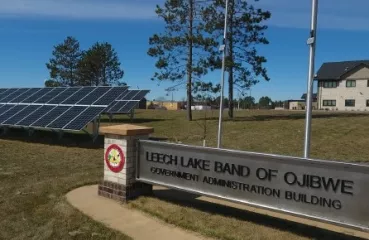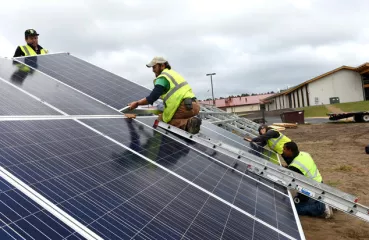With an impressive portfolio of projects completed, the Leech Lake Band of Ojibwe (LLBO or Band) is a leader on sustainability and clean energy in Minnesota and across the Midwest.
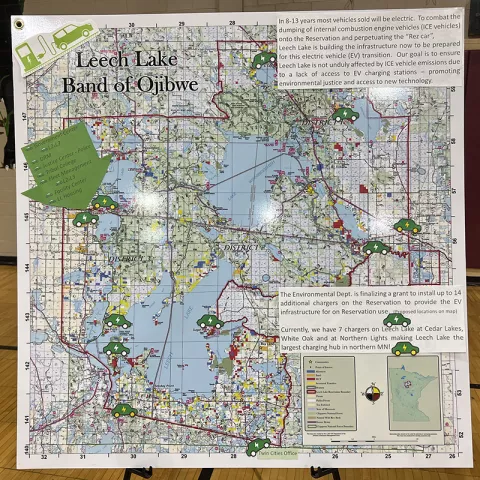 Notably, LLBO is active in the GreenStep program and has been an early adopter of clean energy technologies like electric vehicle charging stations, solar furnaces, and solar PV — installing the first 100% low-income community solar array in Minnesota.
Notably, LLBO is active in the GreenStep program and has been an early adopter of clean energy technologies like electric vehicle charging stations, solar furnaces, and solar PV — installing the first 100% low-income community solar array in Minnesota.
As LLBO advances to Step 5 of the GreenStep Tribal Nations program, Central CERT staff Jordan Sligar sat down with LLBO staff Brandy Toft and Eugene Strowbridge, as well as GreenCorps member Monica Miles, to reflect on LLBO’s sustainability work.
The Leech Lake Band of Ojibwe has built momentum on sustainability by intentionally strengthening collaboration among partners, such as Tribal government entities, their Sustainability Coordinator, and the Green Team. LLBO’s Green Team, which includes employees and community members, gets together to promote traditional teachings, sustainability, and green or eco-friendly ideas on the Leech Lake Reservation.
“The green team is the group of people that has been working on sustainability work across the government…It’s difficult to get many things done when you are working alone, you need collaboration. That collaboration across the Tribal government is our way to do that. We meet regularly to discuss sustainability ideas and projects. We discuss funding opportunities.”
-Eugene Strowbridge, Sustainability Coordinator
Having a dedicated Sustainability Coordinator has also been useful, providing a single point of contact for discussing sustainability and moving projects forward, while the collaboration among Tribal government entities has led to requirements for efficiency requirements for building construction and other green goals.
“One thing I’m happy about is having a Sustainability Program. We may only have one staff person plus a GreenCorps member, but having people keep things pushing forward is very useful…having that main point of contact that can keep things on track, that can work the projects, that can identify connections that need to be made, and that can be advocated for.”
-Brandy Toft, Environmental Director
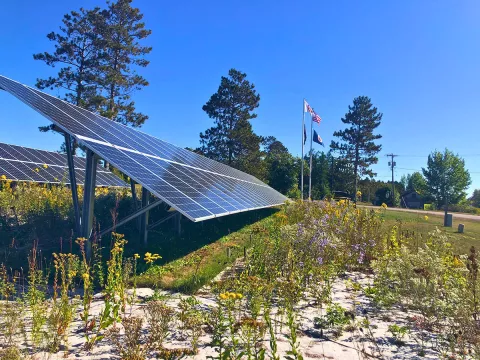 Working with partners like paleBLUEdot and CERTs, LLBO created a sustainability framework plan that provides a starting point for establishing future sustainability policies. Another important collaboration was on the Solar Master Plan for LLBO’s 70-plus government buildings. The plan laid the foundation for future solar installations, which now total 280 kW across the Reservation with plans for another 538 kWs.
Working with partners like paleBLUEdot and CERTs, LLBO created a sustainability framework plan that provides a starting point for establishing future sustainability policies. Another important collaboration was on the Solar Master Plan for LLBO’s 70-plus government buildings. The plan laid the foundation for future solar installations, which now total 280 kW across the Reservation with plans for another 538 kWs.
“The Solar Master Plan has allowed us to not only analyze our current potential solar applications on Tribal government buildings, it has also given us a path forward and an essential part of our next phase to implement an overall sustainability strategic plan. One of the most positive outcomes is that the plan was put into use immediately upon completion — it has had no time to sit on a shelf as so many plans do.”
-Brandy Toft, Environmental Director
With each new clean energy project, LLBO has built momentum, using project success to justify new projects, lift up the community, and serve as a visual reminder of the Leech Lake Band of Ojibwe’s commitment to sustainability. The Guaranteed Energy Savings Project (GESP) was particularly impactful. This project retrofitted 22 public facilities on the Reservation with a variety of clean efficiency measures at a cost of $3.8 million, which will be paid back by the energy savings in 12 years.
This project has shown others that these projects can reduce inefficiencies in a cost-effective way. According to Toft, reactions from within LLBO’s government have been positive: “The GESP program turned attitudes around, was the biggest change. Many of the biggest devil’s advocates turned around and said, yes, this was a good project. We are no longer hesitant about these kinds of projects. We can do these projects and have success. We can do the right thing and be sustainable. More in line with the teachings that being sustainable is attainable and doesn’t cost an arm and a leg. This was a big turning point in the government.”
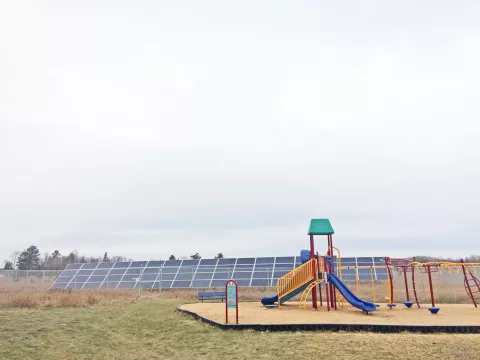
Another successful clean energy project that lifted up the community and increased visibility of the Leech Lake Band of Ojibwe’s commitment to sustainability is the community solar project, which includes five 40kW systems spread out throughout the Reservation. The proceeds from the energy produced by these five solar arrays supports up to 100 Leech Lake families on energy assistance. This 100% low-income community solar array is the first of its kind in Minnesota, and is visible front and center around the Reservation. According to Toft, this is important for showing the efficacy in people’s minds. “The biggest project with direct benefit is from the solar garden — the direct benefit is subsidizing low-income Band members’ heating bills for the winter.”

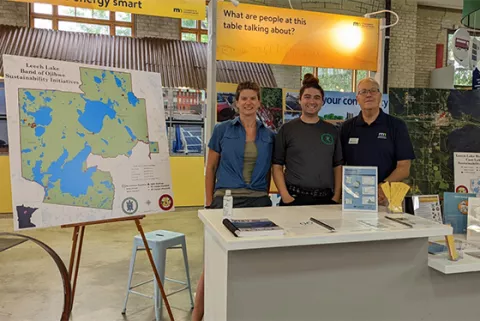 Another way the Leech Lake Band of Ojibwe has built momentum is by utilizing the GreenStep Tribal Nations program. The GreenStep program is a voluntary challenge, assistance, and recognition program to assist Tribes and cities in achieving their sustainability goals. The Leech Lake Band of Ojibwe was the first Tribal nation in Minnesota to join this program. LLBO has used the program as a way to evaluate their progress in sustainability. The Leech Lake Band of Ojibwe advanced three steps in the 2022-2023 program year, most recently achieving Step 5, the program's highest step. “I think the GreenStep program shows that we are more advanced than people give us credit for. We are quiet about our advancement…. We are doing a lot of stuff quietly along the way and then we figure out there are ways to measure it and promote it.”
Another way the Leech Lake Band of Ojibwe has built momentum is by utilizing the GreenStep Tribal Nations program. The GreenStep program is a voluntary challenge, assistance, and recognition program to assist Tribes and cities in achieving their sustainability goals. The Leech Lake Band of Ojibwe was the first Tribal nation in Minnesota to join this program. LLBO has used the program as a way to evaluate their progress in sustainability. The Leech Lake Band of Ojibwe advanced three steps in the 2022-2023 program year, most recently achieving Step 5, the program's highest step. “I think the GreenStep program shows that we are more advanced than people give us credit for. We are quiet about our advancement…. We are doing a lot of stuff quietly along the way and then we figure out there are ways to measure it and promote it.”